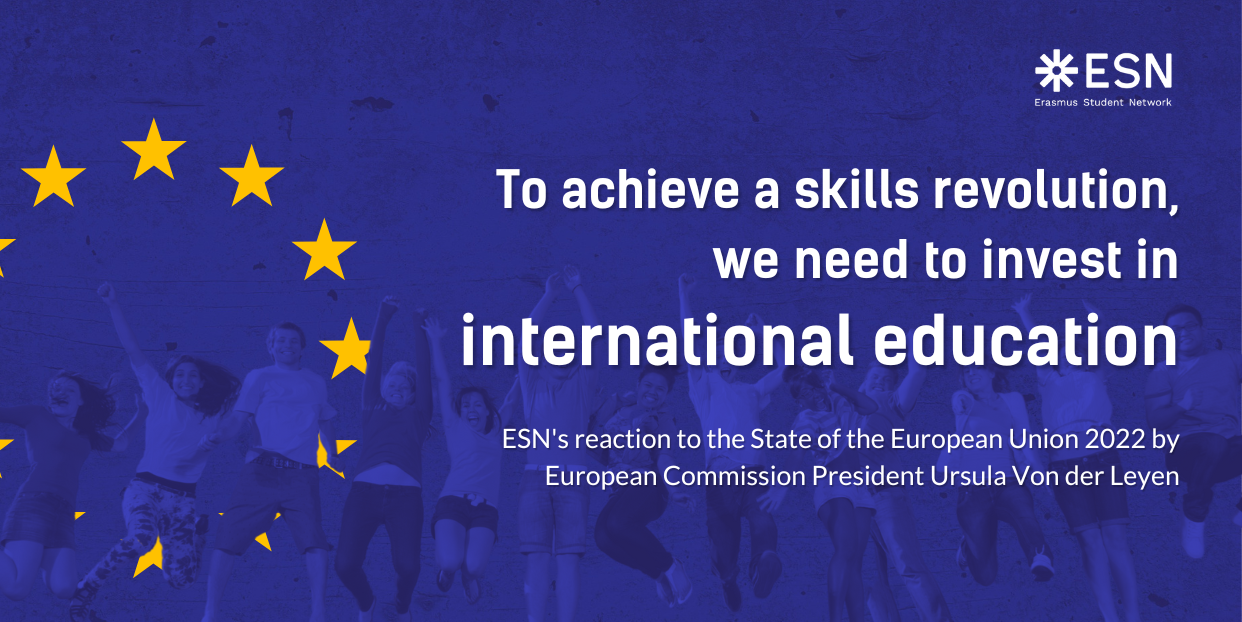
The Erasmus Student Network welcomes the announcement by President Von der Leyden of 2023 being designated the European Year of Skills but asks for better planning and proper resource allocation to make sure that the year delivers significant progress and long-lasting impact in the fields of education and training.
The experience of the European Year of Youth, which was rushed and activity-based instead of legacy-oriented, shows how important planning and organisation are. In that regard, there is a need for a clear structure and agreement on the specific goals that European Institutions, the Member States and stakeholders will work towards. The preparation of the year is in that sense as important as the year itself, and 3 months is not a realistic timeline to make sure that there is proper internal organisation and stakeholder involvement.
Europe is on the brink of a tough crisis that is already affecting young people and people with fewer opportunities disproportionately. The mistakes made during the financial crisis almost a decade ago, which also affected Erasmus students that were close to losing their scholarships, can not be repeated. It is time to prioritise investment in education, training and solidarity to prepare young people within the EU and around the world to navigate the challenges of today's world. The Erasmus+ Impact Studies and ESN´s research, such as the ESN Survey, Green Erasmus or Social Inclusion and Engagement in Mobility, has shown the key role that international education and learning mobility specifically can play in equipping students with the skills needed to face the green transition and digital revolution, as well to boost entrepreneurship and civic engagement.
In the last few years, ESN has worked on a number of initiatives to boost skills development in learning mobility opportunities. First, the Erasmus Skills project provided a set of innovative tools to help Erasmus students enhance and acknowledge the soft skills and competencies gained thanks to their mobility experience since these are not always properly recognised either by the students or by employers. The ErasmusJobs portal allows Erasmus+ graduates to build a personal profile to reflect on competencies gained abroad and get in touch with recruiters who value international experiences. The Erasmus Careers project started in 2022, will define a competence framework; and link the gained competencies through the learning path students undergo on an exchange; linking with employers and career support to bridge the gap to employment opportunities. But the impact of these projects will be limited if they are not fully incorporated into the learning cycles of students during their Erasmus exchanges.
In that regard, the recognition of skills gained through volunteering, and recognition of prior learning in the educational context, should be a core priority for the year. That will allow combining the employability dimension of the skills area with the equally important civic engagement component.
Erasmus+ Internships, mentioned in the European Strategy for Universities, can have an important role in boosting skill acquisition among young Europeans. Erasmus+ traineeships have tremendous untapped potential, but there is a need to foster quality standards, support for students and measures to prepare companies to host trainees and accompany their learning process. ESN manages Erasmusintern.org, the biggest platform connecting traineeship seekers and companies interested in hosting interns. With more than 28 million views in 2021, the platform can play a key role in improving Erasmus+ internships across Europe. However, specific support is needed to make the platform sustainable.
Attracting talent from abroad was also highlighted by President Von der Leyen as a key priority for the European Union. However, students and young professionals still face insurmountable issues applying for visas to get to most EU Member States, even when they do so as beneficiaries of EU programmes such as Erasmus+. Further coordination efforts are needed from the Commission to make sure these barriers are removed.
Learning mobility, included in the Treaties as one of the areas within the Education and Youth realm in which the EU should play a role in supporting the Member States, has proved to be one of the most effective ways to bring Europe close to the citizens while fostering social cohesion. Learning mobility can also play a key role in reinforcing freedom of movement and labour mobility, which are key to tackling skills shortages and making the most out of the single market.
Together with Higher Education students, the number of pupils, VET learners and lifelong learners taking part in learning mobility should also continue to grow in the next few years, thanks to reinforced financial support and the removal of administrative barriers. ESN advocates for new mobility targets in all educational sectors that support the fulfilment of the Strategic Framework for Cooperation Education and Training to “Make mobility a reality for all”.
Solidarity with students from Ukraine should continue to be a priority during this year. Together with ESU, EUF and Coimbra Group ESN has advocated for changes in the Erasmus+ Programme and for fresh funds to ensure that students can benefit from these opportunities. Diplomatic efforts are needed to ensure that students can access these opportunities without facing challenges at the border, and coordination at the European level is required so students from Ukraine can access information about the processes to submit their applications and navigate the administrative processes.
In a complex geopolitical environment, the role of international cooperation is more important than ever. The role of the Erasmus+ Programme in promoting opportunities for young people around the world, and especially in the EU neighbouring countries, can not be overestimated. In that regard, the Commission should consider negotiating the accession of Albania, Ukraine, Moldova and Georgia as Erasmus+ Programme countries in the next few years.

Follow ESN